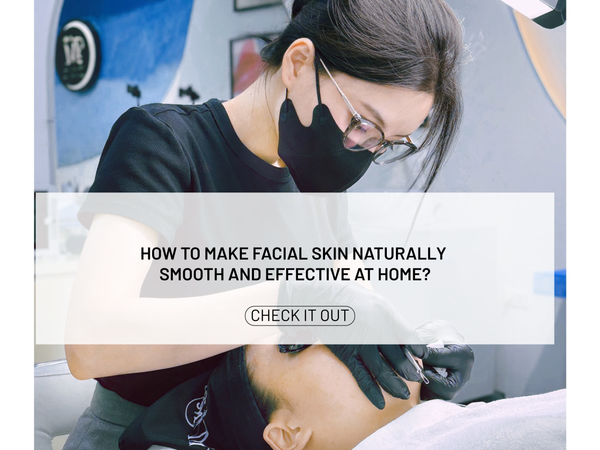Explore the Causes of Skin Pigmentation: Things You Didn't Know
Skin pigmentation is a common issue that many people face, especially women. This phenomenon not only affects external beauty but also impacts the psychology and confidence of those affected. This article will help you explore the causes of skin pigmentation that you may not know, and from there, find effective prevention and treatment methods.
Highlights
- Skin pigmentation can be caused by hormonal changes, especially during pregnancy and menopause.
- Sunlight is the main cause of pigmentation, so using sunscreen is essential.
- Genetic factors also play an important role in the formation of skin pigmentation.
- Using inappropriate cosmetics can increase the risk of skin pigmentation.
- Stress and an unhealthy diet also affect skin condition.
Endogenous Causes of Skin Pigmentation

Hormonal Changes
Skin pigmentation often appears due to hormonal changes in the body. In particular, pregnant women or those in the perimenopausal stage may experience this condition. The increase in hormones such as estrogen and progesterone can stimulate melanin production, leading to skin pigmentation.
Genetic Factors
One of the other important causes is genetic factors. If someone in the family has pigmentation, there is a high chance that we will also encounter this condition. Studies show that about 33-50% of people with pigmentation are related to genetics.
Skin Aging
Finally, skin aging is also a cause that cannot be overlooked. As age increases, the ability to produce collagen and elastin decreases, making the skin thinner and more vulnerable. This can lead to the formation of pigmentation patches on the skin, especially in areas that are frequently exposed to sunlight.
Exogenous Causes of Skin Pigmentation

Skin pigmentation is not only caused by internal factors but is also influenced by many external factors. We need to pay attention to these causes to protect our skin. Below are some main exogenous causes:
Impact of Sunlight
- Sunlight is the leading cause of skin pigmentation. UV rays can increase melanin production, leading to the formation of brown spots on the skin.
- We should use sunscreen daily to protect the skin from the harmful effects of sunlight.
Using Inappropriate Cosmetics
- Some cosmetics can make the skin sensitive to sunlight, causing pigmentation.
- We need to choose skincare products suitable for our skin type to avoid irritation.
Environmental Impact
- Air pollution and dirt can damage the skin, making it more prone to pigmentation.
- To protect the skin, we should wash our face regularly and limit exposure to polluted environments.
Thus, understanding the exogenous causes of skin pigmentation will help us take more effective preventive measures.
Impact of Skin Pigmentation on Life
Skin pigmentation is not only an aesthetic issue but also profoundly affects our daily lives. We need to be aware of these impacts to find ways to address them.
Psychological Impact
- Skin pigmentation can cause feelings of inferiority, making us shy to interact with others.
- Many people feel anxious and stressed when facing their skin condition.
- This inferiority can lead to depression or feelings of loneliness.
Impact on Communication
- Skin pigmentation can reduce confidence in communication, making us shy when interacting with others.
- We may feel uncomfortable when taking photos or participating in social activities.
- This can affect personal and work relationships.
Impact on Self-Confidence
- Skin pigmentation can reduce our self-confidence in daily life.
- We may feel uncomfortable appearing in front of a crowd.
- Taking care of the skin and treating pigmentation can help improve this condition, but it requires persistence and protection from sunlight.
We need to remember that taking care of ourselves and our skin not only helps improve our appearance but also enhances our quality of life.
Distinguishing Types of Skin Pigmentation
We need to understand the types of skin pigmentation to have appropriate treatment methods. According to clinical classification, skin pigmentation is divided into three main types:
Superficial Pigmentation
- Superficial pigmentation usually has a light brown color and is located in the epidermis.
- This type of pigmentation often appears in small patches on the forehead, cheekbones, nose, and chin.
- The edges of superficial pigmentation are very clear, making it easy to distinguish from the surrounding skin.
Deep Pigmentation
- Deep pigmentation ranges from light brown to dark brown, with roots located deep under the skin.
- This type of pigmentation often appears in small spots, similar to post-acne marks.
- Deep pigmentation is often seen in women over 30, especially during the perimenopausal stage.
Mixed Pigmentation
- Mixed pigmentation is a combination of superficial and deep pigmentation, often appearing scattered on the face.
- The color and size of mixed pigmentation are uneven, making treatment more difficult.
Distinguishing the types of skin pigmentation helps us have more effective treatment measures. If you show signs of pigmentation, consult a dermatologist for timely advice and treatment.
Treatment Methods for Skin Pigmentation

Using Creams
We can start treating skin pigmentation by using creams containing skin brightening ingredients. Some important ingredients include:
- Niacinamide: Helps brighten and even out skin tone.
- Vitamin C: Boosts skin resistance and fades pigmentation.
- Glycolic acid: Helps remove dead skin cells and brighten the skin.
Laser Treatment
If the pigmentation condition does not improve, we may consider laser treatment. This method helps break down the pigments causing pigmentation and stimulates collagen production, resulting in a more even and brighter skin tone. However, it should be noted that the effects are not permanent.
Mesotherapy
Another method is mesotherapy, in which active ingredients are injected deep into the skin. This method helps provide moisture and brighten the skin from within. We should consult experts before performing it to ensure safety and effectiveness.
Effective Prevention of Skin Pigmentation
To protect the skin from pigmentation, we need to implement some effective preventive measures. Proper skincare is the key to keeping the skin healthy and radiant.
Using Sunscreen
- Apply sunscreen with an SPF of over 30 daily, even when indoors.
- Make sure to apply sunscreen 15-30 minutes before going outside to protect the skin from UV rays.
Healthy Diet
- Eat plenty of green vegetables and fresh fruits to provide vitamins and minerals for the skin.
- Limit fast food, greasy foods, and stimulants like alcohol and tobacco.
Avoid Prolonged Stress
- Engage in relaxing activities such as yoga, meditation, or exercise to reduce stress.
- Get enough sleep and maintain a positive mindset to help keep the skin healthy.
Avoid Overusing Cosmetics
- Choose cosmetics with clear origins, avoiding products with unclear ingredients.
- Avoid heavy makeup, as this can irritate the skin.
Regular Dermatologist Check-ups
- If there are any unusual signs on the skin, consult a dermatologist for timely advice and treatment.
By implementing these measures, we can minimize the risk of skin pigmentation and maintain beautiful, healthy skin.
The Role of Daily Skincare

Daily skincare is an essential part of maintaining the health and beauty of the skin. This not only helps the skin stay healthy but also prevents premature aging. Here are some reasons why we need to care for our skin every day:
Cleansing the Skin
- Helps remove dirt and excess oil.
- Prevents acne and skin inflammation.
- Improves skin pigmentation, helping the skin to be more even-toned.
Moisturizing Properly
- Provides essential moisture for the skin.
- Keeps the skin soft and prevents dryness.
- Enhances the skin's protective barrier against external impacts.
Using Suitable Products
- Choose skincare products suitable for your skin type.
- Use sunscreen daily to protect the skin from UV rays.
- Exfoliate regularly to brighten and improve skin texture.
Let’s take care of and protect our skin from environmental harm to achieve healthy and radiant skin!
Daily skincare is an important part of maintaining healthy and radiant skin. Don’t miss the opportunity to learn more about effective skincare products and methods on our website. Visit MinT Foundation to discover amazing beauty tips!
Conclusion
Skin pigmentation is a common issue that many people face, especially women. Understanding the causes of pigmentation will help you have more effective prevention and treatment methods. From sunlight, hormonal changes to stress and unhealthy diets, all can contribute to the formation of pigmentation. To protect your skin, pay attention to skincare and use appropriate products. If you encounter skin pigmentation, do not hesitate to consult a dermatologist for timely advice and treatment.
Frequently Asked Questions
What is skin pigmentation?
Skin pigmentation is a condition where the skin has brown or black patches due to increased melanin pigmentation.
What are the causes of skin pigmentation?
Skin pigmentation can be caused by many factors such as hormonal changes, sunlight, genetics, and using inappropriate cosmetics.
Can skin pigmentation be treated?
Yes, skin pigmentation can be treated with methods such as using creams, laser treatments, or mesotherapy.
How can skin pigmentation be prevented?
To prevent skin pigmentation, you should use sunscreen, maintain a healthy diet, and reduce stress.
Who is more likely to have skin pigmentation?
Women, especially during pregnancy or menopause, are at higher risk of skin pigmentation.
Can skin pigmentation recur?
Yes, if the skin is not properly cared for or exposed to pigmentation-causing factors, this condition can recur.



